ENGG 405: Managing Stakeholders in Australian Construction Projects
VerifiedAdded on 2023/06/07
|6
|1539
|454
Report
AI Summary
This report investigates the critical success factors (CSF) for effectively managing stakeholders in construction projects in Australia. It addresses the background and need for research, highlighting issues such as poor stakeholder engagement and communication problems within the Australian construction industry. The research aims to identify the roles of stakeholders, explore challenges faced by project managers, and provide recommendations to construction agencies for implementing a CSF approach. A deductive approach, incorporating both primary data from interviews with construction project managers and secondary data from journals and reports, will be used. The literature review focuses on identifying secondary sources and aligning them with primary data to provide a comprehensive analysis of stakeholder management in Australian construction projects. Desklib provides access to this and other solved assignments.
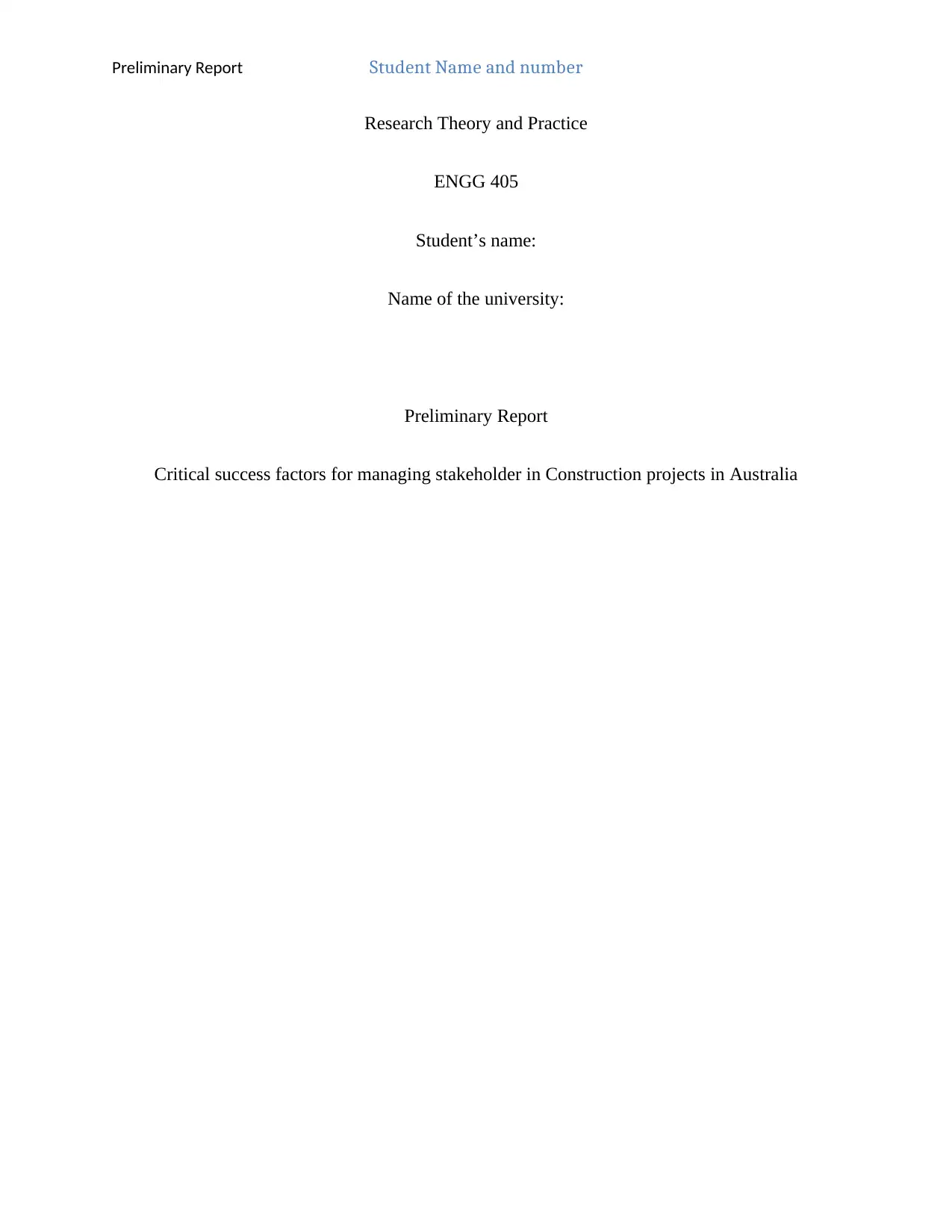
Preliminary Report Student Name and number
Research Theory and Practice
ENGG 405
Student’s name:
Name of the university:
Preliminary Report
Critical success factors for managing stakeholder in Construction projects in Australia
Research Theory and Practice
ENGG 405
Student’s name:
Name of the university:
Preliminary Report
Critical success factors for managing stakeholder in Construction projects in Australia
Paraphrase This Document
Need a fresh take? Get an instant paraphrase of this document with our AI Paraphraser
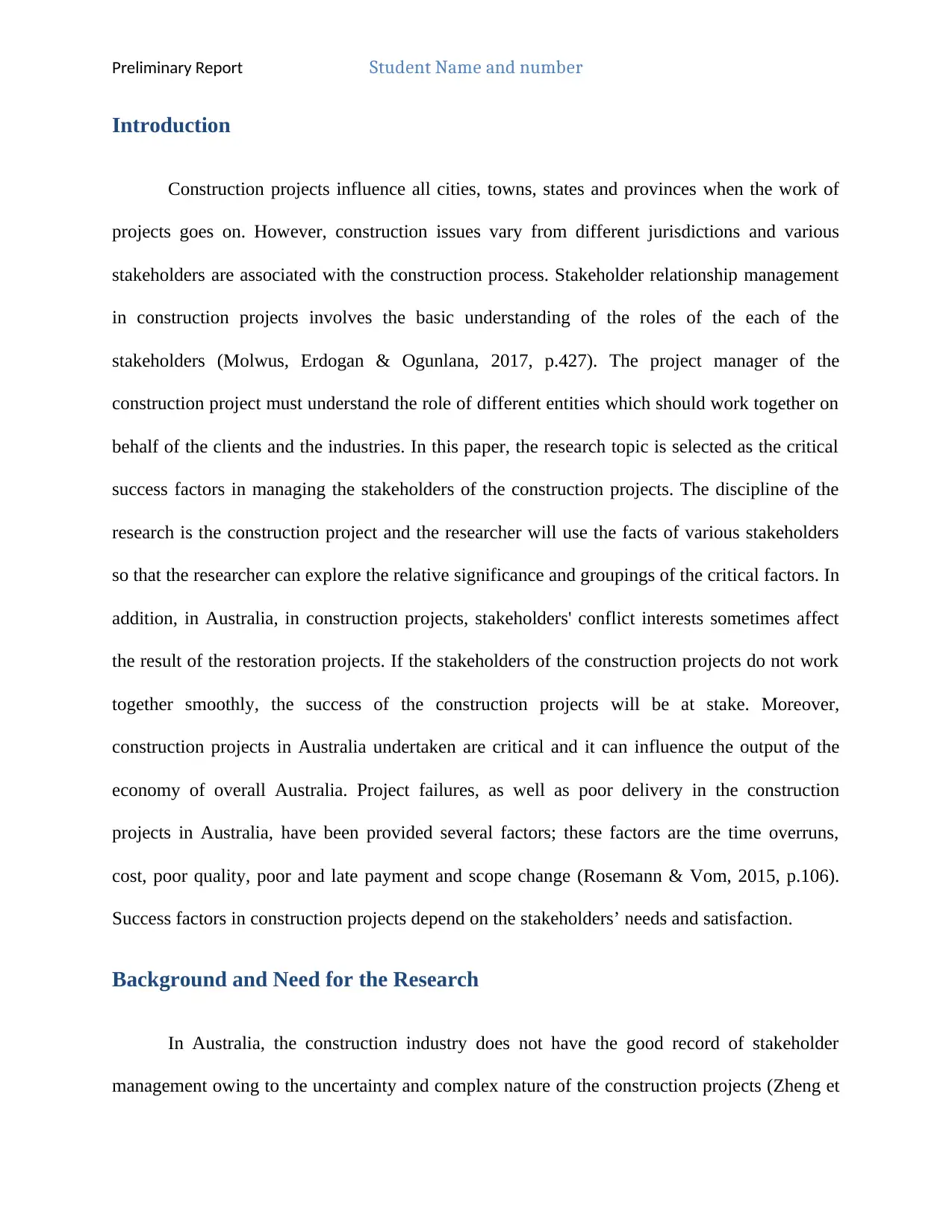
Preliminary Report Student Name and number
Introduction
Construction projects influence all cities, towns, states and provinces when the work of
projects goes on. However, construction issues vary from different jurisdictions and various
stakeholders are associated with the construction process. Stakeholder relationship management
in construction projects involves the basic understanding of the roles of the each of the
stakeholders (Molwus, Erdogan & Ogunlana, 2017, p.427). The project manager of the
construction project must understand the role of different entities which should work together on
behalf of the clients and the industries. In this paper, the research topic is selected as the critical
success factors in managing the stakeholders of the construction projects. The discipline of the
research is the construction project and the researcher will use the facts of various stakeholders
so that the researcher can explore the relative significance and groupings of the critical factors. In
addition, in Australia, in construction projects, stakeholders' conflict interests sometimes affect
the result of the restoration projects. If the stakeholders of the construction projects do not work
together smoothly, the success of the construction projects will be at stake. Moreover,
construction projects in Australia undertaken are critical and it can influence the output of the
economy of overall Australia. Project failures, as well as poor delivery in the construction
projects in Australia, have been provided several factors; these factors are the time overruns,
cost, poor quality, poor and late payment and scope change (Rosemann & Vom, 2015, p.106).
Success factors in construction projects depend on the stakeholders’ needs and satisfaction.
Background and Need for the Research
In Australia, the construction industry does not have the good record of stakeholder
management owing to the uncertainty and complex nature of the construction projects (Zheng et
Introduction
Construction projects influence all cities, towns, states and provinces when the work of
projects goes on. However, construction issues vary from different jurisdictions and various
stakeholders are associated with the construction process. Stakeholder relationship management
in construction projects involves the basic understanding of the roles of the each of the
stakeholders (Molwus, Erdogan & Ogunlana, 2017, p.427). The project manager of the
construction project must understand the role of different entities which should work together on
behalf of the clients and the industries. In this paper, the research topic is selected as the critical
success factors in managing the stakeholders of the construction projects. The discipline of the
research is the construction project and the researcher will use the facts of various stakeholders
so that the researcher can explore the relative significance and groupings of the critical factors. In
addition, in Australia, in construction projects, stakeholders' conflict interests sometimes affect
the result of the restoration projects. If the stakeholders of the construction projects do not work
together smoothly, the success of the construction projects will be at stake. Moreover,
construction projects in Australia undertaken are critical and it can influence the output of the
economy of overall Australia. Project failures, as well as poor delivery in the construction
projects in Australia, have been provided several factors; these factors are the time overruns,
cost, poor quality, poor and late payment and scope change (Rosemann & Vom, 2015, p.106).
Success factors in construction projects depend on the stakeholders’ needs and satisfaction.
Background and Need for the Research
In Australia, the construction industry does not have the good record of stakeholder
management owing to the uncertainty and complex nature of the construction projects (Zheng et
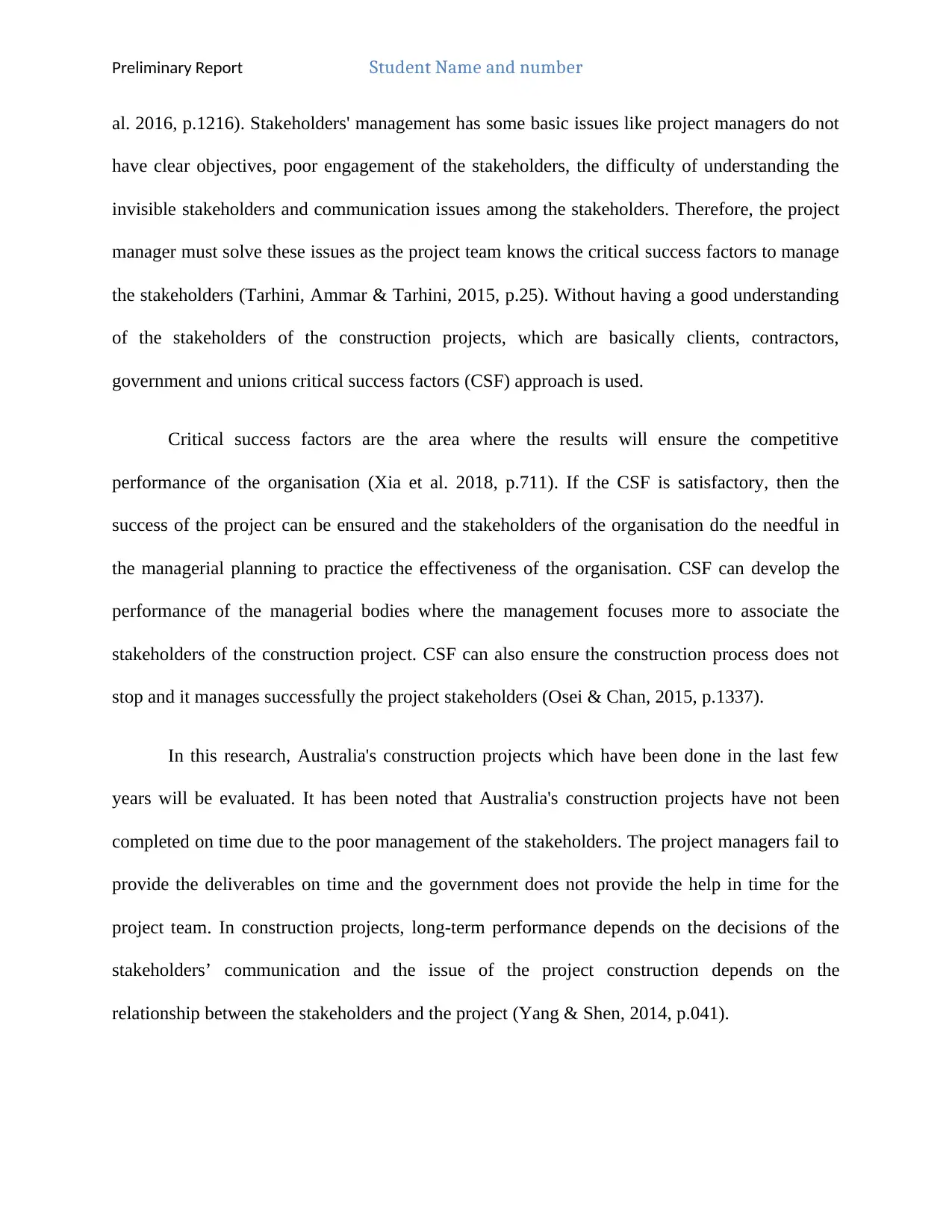
Preliminary Report Student Name and number
al. 2016, p.1216). Stakeholders' management has some basic issues like project managers do not
have clear objectives, poor engagement of the stakeholders, the difficulty of understanding the
invisible stakeholders and communication issues among the stakeholders. Therefore, the project
manager must solve these issues as the project team knows the critical success factors to manage
the stakeholders (Tarhini, Ammar & Tarhini, 2015, p.25). Without having a good understanding
of the stakeholders of the construction projects, which are basically clients, contractors,
government and unions critical success factors (CSF) approach is used.
Critical success factors are the area where the results will ensure the competitive
performance of the organisation (Xia et al. 2018, p.711). If the CSF is satisfactory, then the
success of the project can be ensured and the stakeholders of the organisation do the needful in
the managerial planning to practice the effectiveness of the organisation. CSF can develop the
performance of the managerial bodies where the management focuses more to associate the
stakeholders of the construction project. CSF can also ensure the construction process does not
stop and it manages successfully the project stakeholders (Osei & Chan, 2015, p.1337).
In this research, Australia's construction projects which have been done in the last few
years will be evaluated. It has been noted that Australia's construction projects have not been
completed on time due to the poor management of the stakeholders. The project managers fail to
provide the deliverables on time and the government does not provide the help in time for the
project team. In construction projects, long-term performance depends on the decisions of the
stakeholders’ communication and the issue of the project construction depends on the
relationship between the stakeholders and the project (Yang & Shen, 2014, p.041).
al. 2016, p.1216). Stakeholders' management has some basic issues like project managers do not
have clear objectives, poor engagement of the stakeholders, the difficulty of understanding the
invisible stakeholders and communication issues among the stakeholders. Therefore, the project
manager must solve these issues as the project team knows the critical success factors to manage
the stakeholders (Tarhini, Ammar & Tarhini, 2015, p.25). Without having a good understanding
of the stakeholders of the construction projects, which are basically clients, contractors,
government and unions critical success factors (CSF) approach is used.
Critical success factors are the area where the results will ensure the competitive
performance of the organisation (Xia et al. 2018, p.711). If the CSF is satisfactory, then the
success of the project can be ensured and the stakeholders of the organisation do the needful in
the managerial planning to practice the effectiveness of the organisation. CSF can develop the
performance of the managerial bodies where the management focuses more to associate the
stakeholders of the construction project. CSF can also ensure the construction process does not
stop and it manages successfully the project stakeholders (Osei & Chan, 2015, p.1337).
In this research, Australia's construction projects which have been done in the last few
years will be evaluated. It has been noted that Australia's construction projects have not been
completed on time due to the poor management of the stakeholders. The project managers fail to
provide the deliverables on time and the government does not provide the help in time for the
project team. In construction projects, long-term performance depends on the decisions of the
stakeholders’ communication and the issue of the project construction depends on the
relationship between the stakeholders and the project (Yang & Shen, 2014, p.041).
⊘ This is a preview!⊘
Do you want full access?
Subscribe today to unlock all pages.

Trusted by 1+ million students worldwide
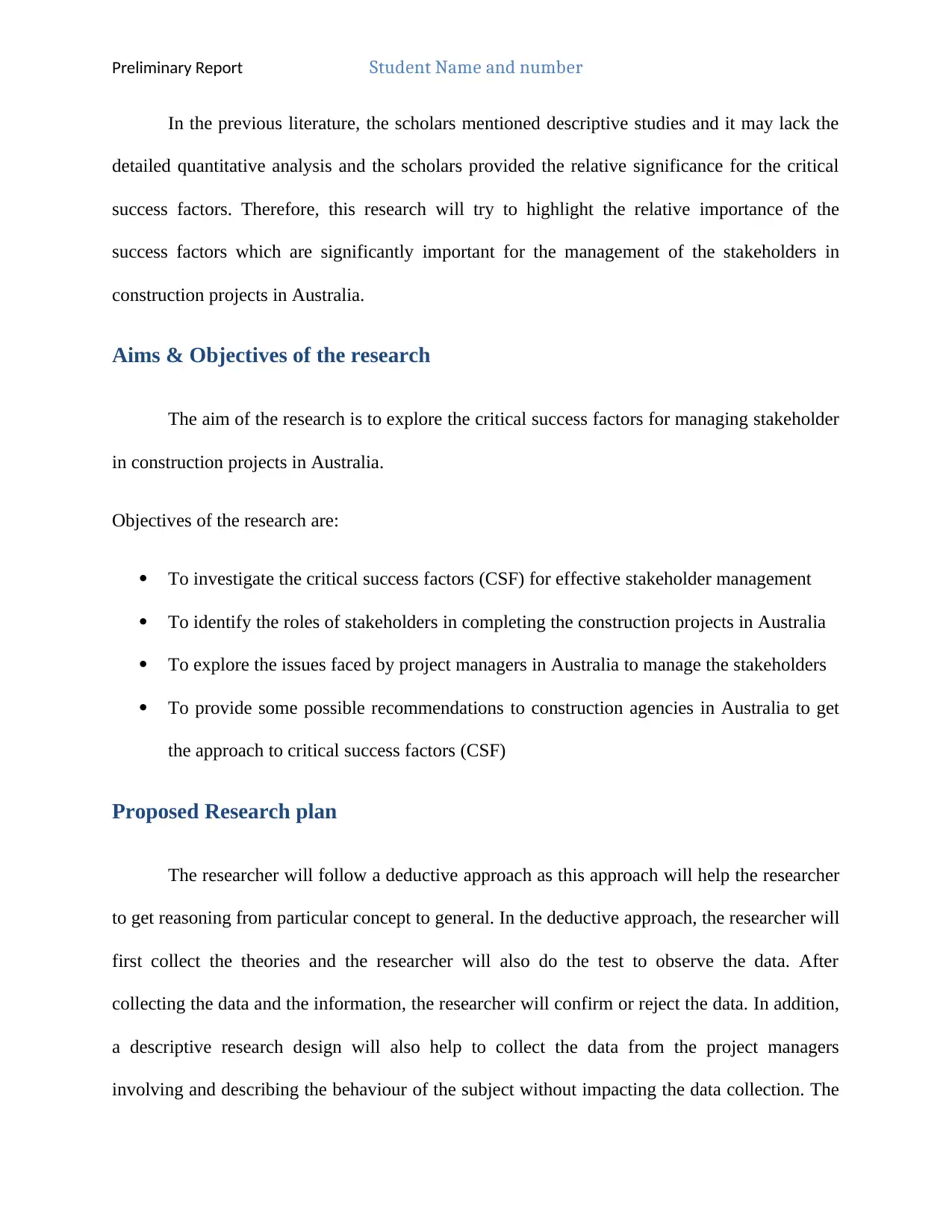
Preliminary Report Student Name and number
In the previous literature, the scholars mentioned descriptive studies and it may lack the
detailed quantitative analysis and the scholars provided the relative significance for the critical
success factors. Therefore, this research will try to highlight the relative importance of the
success factors which are significantly important for the management of the stakeholders in
construction projects in Australia.
Aims & Objectives of the research
The aim of the research is to explore the critical success factors for managing stakeholder
in construction projects in Australia.
Objectives of the research are:
To investigate the critical success factors (CSF) for effective stakeholder management
To identify the roles of stakeholders in completing the construction projects in Australia
To explore the issues faced by project managers in Australia to manage the stakeholders
To provide some possible recommendations to construction agencies in Australia to get
the approach to critical success factors (CSF)
Proposed Research plan
The researcher will follow a deductive approach as this approach will help the researcher
to get reasoning from particular concept to general. In the deductive approach, the researcher will
first collect the theories and the researcher will also do the test to observe the data. After
collecting the data and the information, the researcher will confirm or reject the data. In addition,
a descriptive research design will also help to collect the data from the project managers
involving and describing the behaviour of the subject without impacting the data collection. The
In the previous literature, the scholars mentioned descriptive studies and it may lack the
detailed quantitative analysis and the scholars provided the relative significance for the critical
success factors. Therefore, this research will try to highlight the relative importance of the
success factors which are significantly important for the management of the stakeholders in
construction projects in Australia.
Aims & Objectives of the research
The aim of the research is to explore the critical success factors for managing stakeholder
in construction projects in Australia.
Objectives of the research are:
To investigate the critical success factors (CSF) for effective stakeholder management
To identify the roles of stakeholders in completing the construction projects in Australia
To explore the issues faced by project managers in Australia to manage the stakeholders
To provide some possible recommendations to construction agencies in Australia to get
the approach to critical success factors (CSF)
Proposed Research plan
The researcher will follow a deductive approach as this approach will help the researcher
to get reasoning from particular concept to general. In the deductive approach, the researcher will
first collect the theories and the researcher will also do the test to observe the data. After
collecting the data and the information, the researcher will confirm or reject the data. In addition,
a descriptive research design will also help to collect the data from the project managers
involving and describing the behaviour of the subject without impacting the data collection. The
Paraphrase This Document
Need a fresh take? Get an instant paraphrase of this document with our AI Paraphraser
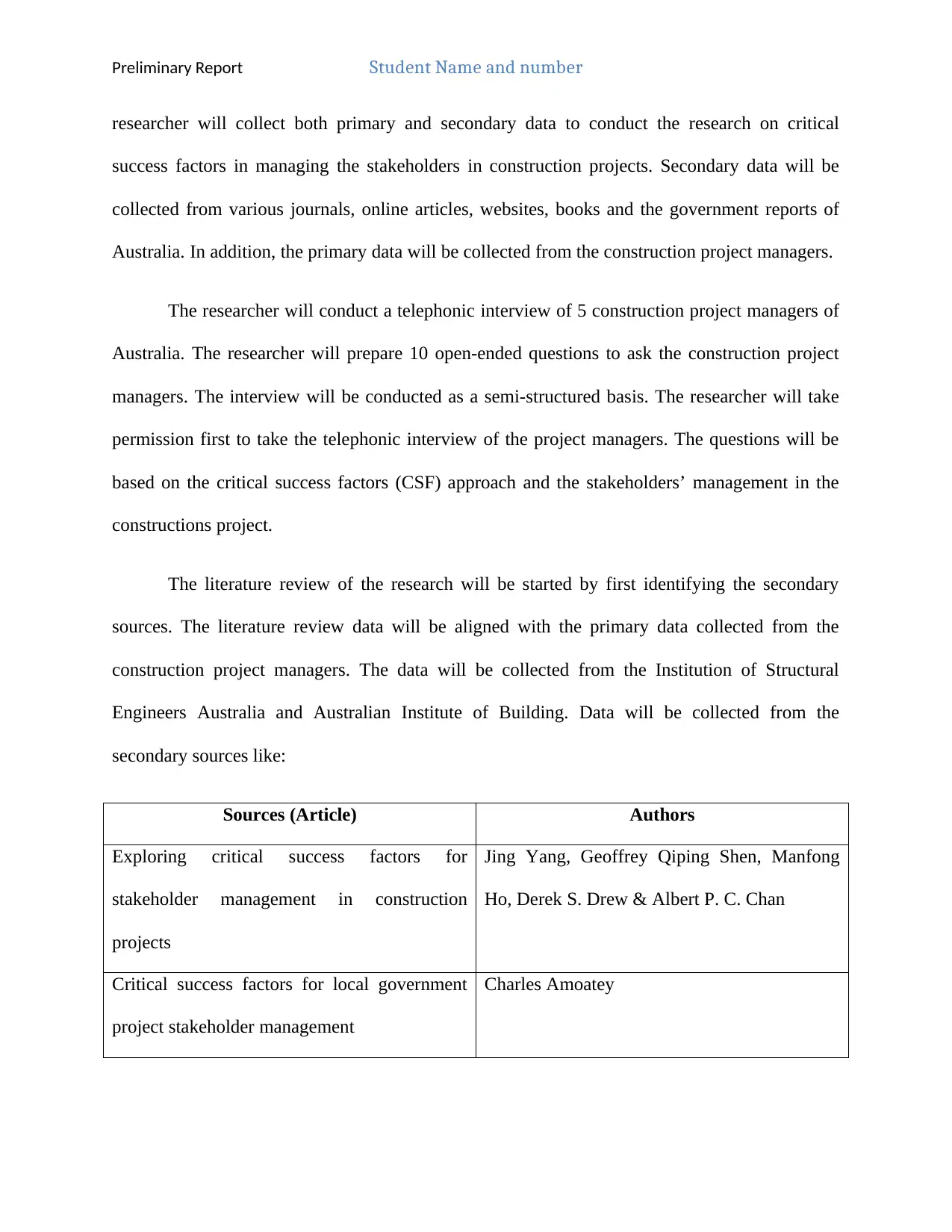
Preliminary Report Student Name and number
researcher will collect both primary and secondary data to conduct the research on critical
success factors in managing the stakeholders in construction projects. Secondary data will be
collected from various journals, online articles, websites, books and the government reports of
Australia. In addition, the primary data will be collected from the construction project managers.
The researcher will conduct a telephonic interview of 5 construction project managers of
Australia. The researcher will prepare 10 open-ended questions to ask the construction project
managers. The interview will be conducted as a semi-structured basis. The researcher will take
permission first to take the telephonic interview of the project managers. The questions will be
based on the critical success factors (CSF) approach and the stakeholders’ management in the
constructions project.
The literature review of the research will be started by first identifying the secondary
sources. The literature review data will be aligned with the primary data collected from the
construction project managers. The data will be collected from the Institution of Structural
Engineers Australia and Australian Institute of Building. Data will be collected from the
secondary sources like:
Sources (Article) Authors
Exploring critical success factors for
stakeholder management in construction
projects
Jing Yang, Geoffrey Qiping Shen, Manfong
Ho, Derek S. Drew & Albert P. C. Chan
Critical success factors for local government
project stakeholder management
Charles Amoatey
researcher will collect both primary and secondary data to conduct the research on critical
success factors in managing the stakeholders in construction projects. Secondary data will be
collected from various journals, online articles, websites, books and the government reports of
Australia. In addition, the primary data will be collected from the construction project managers.
The researcher will conduct a telephonic interview of 5 construction project managers of
Australia. The researcher will prepare 10 open-ended questions to ask the construction project
managers. The interview will be conducted as a semi-structured basis. The researcher will take
permission first to take the telephonic interview of the project managers. The questions will be
based on the critical success factors (CSF) approach and the stakeholders’ management in the
constructions project.
The literature review of the research will be started by first identifying the secondary
sources. The literature review data will be aligned with the primary data collected from the
construction project managers. The data will be collected from the Institution of Structural
Engineers Australia and Australian Institute of Building. Data will be collected from the
secondary sources like:
Sources (Article) Authors
Exploring critical success factors for
stakeholder management in construction
projects
Jing Yang, Geoffrey Qiping Shen, Manfong
Ho, Derek S. Drew & Albert P. C. Chan
Critical success factors for local government
project stakeholder management
Charles Amoatey
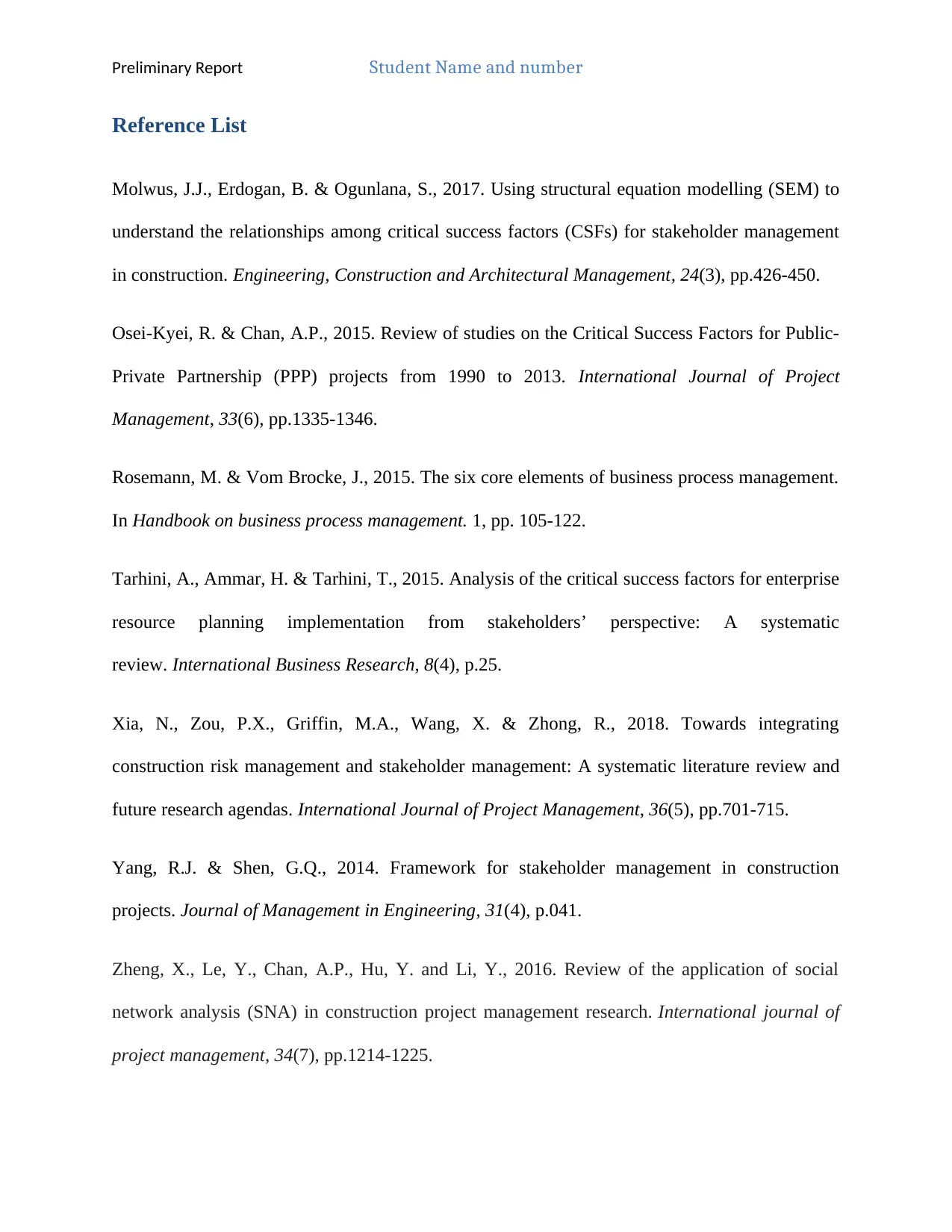
Preliminary Report Student Name and number
Reference List
Molwus, J.J., Erdogan, B. & Ogunlana, S., 2017. Using structural equation modelling (SEM) to
understand the relationships among critical success factors (CSFs) for stakeholder management
in construction. Engineering, Construction and Architectural Management, 24(3), pp.426-450.
Osei-Kyei, R. & Chan, A.P., 2015. Review of studies on the Critical Success Factors for Public-
Private Partnership (PPP) projects from 1990 to 2013. International Journal of Project
Management, 33(6), pp.1335-1346.
Rosemann, M. & Vom Brocke, J., 2015. The six core elements of business process management.
In Handbook on business process management. 1, pp. 105-122.
Tarhini, A., Ammar, H. & Tarhini, T., 2015. Analysis of the critical success factors for enterprise
resource planning implementation from stakeholders’ perspective: A systematic
review. International Business Research, 8(4), p.25.
Xia, N., Zou, P.X., Griffin, M.A., Wang, X. & Zhong, R., 2018. Towards integrating
construction risk management and stakeholder management: A systematic literature review and
future research agendas. International Journal of Project Management, 36(5), pp.701-715.
Yang, R.J. & Shen, G.Q., 2014. Framework for stakeholder management in construction
projects. Journal of Management in Engineering, 31(4), p.041.
Zheng, X., Le, Y., Chan, A.P., Hu, Y. and Li, Y., 2016. Review of the application of social
network analysis (SNA) in construction project management research. International journal of
project management, 34(7), pp.1214-1225.
Reference List
Molwus, J.J., Erdogan, B. & Ogunlana, S., 2017. Using structural equation modelling (SEM) to
understand the relationships among critical success factors (CSFs) for stakeholder management
in construction. Engineering, Construction and Architectural Management, 24(3), pp.426-450.
Osei-Kyei, R. & Chan, A.P., 2015. Review of studies on the Critical Success Factors for Public-
Private Partnership (PPP) projects from 1990 to 2013. International Journal of Project
Management, 33(6), pp.1335-1346.
Rosemann, M. & Vom Brocke, J., 2015. The six core elements of business process management.
In Handbook on business process management. 1, pp. 105-122.
Tarhini, A., Ammar, H. & Tarhini, T., 2015. Analysis of the critical success factors for enterprise
resource planning implementation from stakeholders’ perspective: A systematic
review. International Business Research, 8(4), p.25.
Xia, N., Zou, P.X., Griffin, M.A., Wang, X. & Zhong, R., 2018. Towards integrating
construction risk management and stakeholder management: A systematic literature review and
future research agendas. International Journal of Project Management, 36(5), pp.701-715.
Yang, R.J. & Shen, G.Q., 2014. Framework for stakeholder management in construction
projects. Journal of Management in Engineering, 31(4), p.041.
Zheng, X., Le, Y., Chan, A.P., Hu, Y. and Li, Y., 2016. Review of the application of social
network analysis (SNA) in construction project management research. International journal of
project management, 34(7), pp.1214-1225.
⊘ This is a preview!⊘
Do you want full access?
Subscribe today to unlock all pages.

Trusted by 1+ million students worldwide
1 out of 6
Related Documents
Your All-in-One AI-Powered Toolkit for Academic Success.
+13062052269
info@desklib.com
Available 24*7 on WhatsApp / Email
![[object Object]](/_next/static/media/star-bottom.7253800d.svg)
Unlock your academic potential
Copyright © 2020–2026 A2Z Services. All Rights Reserved. Developed and managed by ZUCOL.




